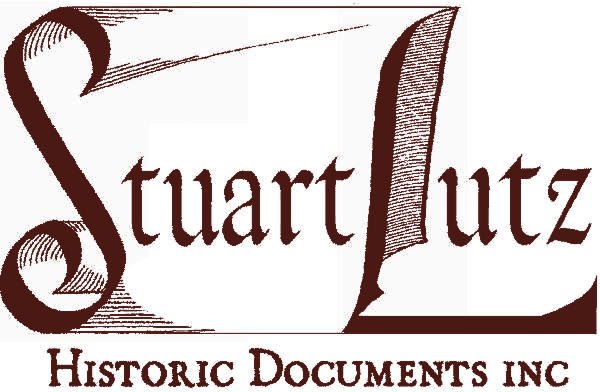| |
 HERMAN GRIMM HERMAN GRIMM |
|
|
|
|
| |
Price: $300.00 |
Stock# 2714 |
| |
HERMAN GRIMM (1828-1901). Herman was the second son of Wilhelm Grimm of fairytale fame. He was a professor of the history of modern art at University of Berlin and an essayist. Grimm dedicated his first collection, Essays, to Ralph Waldo Emerson.
ALS. 1pg 8 x 10. December 27, 1871. Berlin. An autograph letter signed Herman Grimm to an unnamed recipient; it is written in German: Most Honorable Sir, Unfortunately it is not possible for me to accept your honorable invitation. My lectures at the university are such that I would not have the time to make the trip to Koeln [Cologne], and they have placed such a demand on my time this winter that none is left for leisure. With excellent deep respect Your most devoted, Herman Grimm. The letter has mailing folds and is in fine condition. |
2714
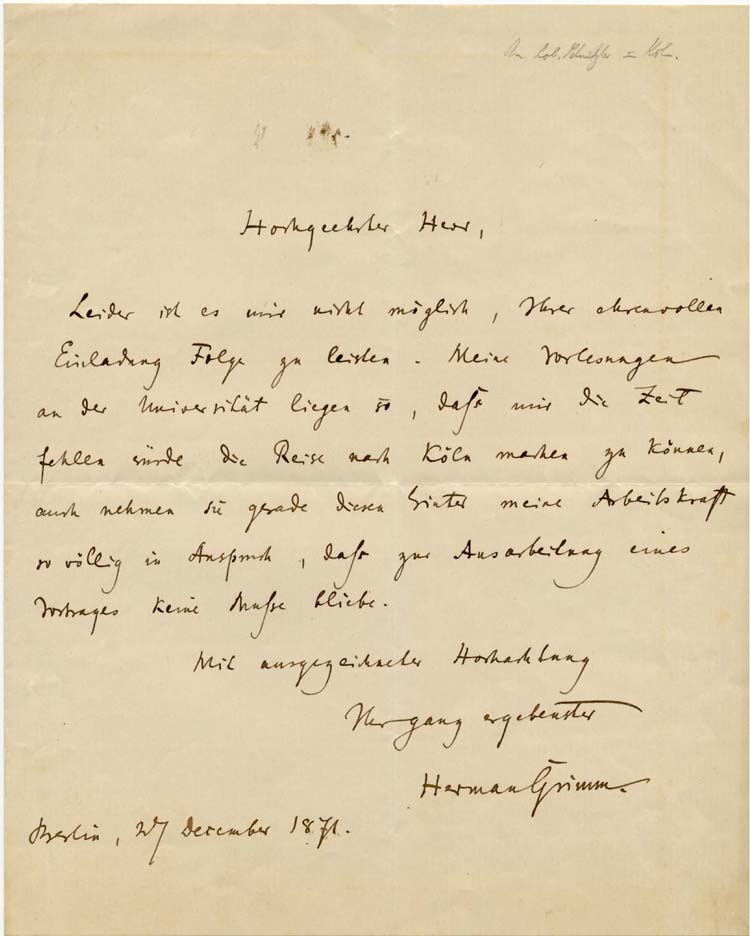
|
|
| |
| |
 HIROHITO HIROHITO |
|
|
|
|
| |
Price: $5,000.00 |
Stock# 6264 |
| |
JAPANESE GOVERNMENT DOCUMENT SIGNED BY WORLD WAR II EMPEROR HIROHITO
HIROHITO (1901-1989). Hirohito was the 124th Emperor of Japan from 1926 until his death in 1989.
DS. 4pgs. 13” x 9”. 1981. Tokyo. A document signed with his ink symbols on a cardstock bifold. The Japanese document translates as: “To His Excellency Mr. President of the Republic of Bolivia…Desiring to maintain and tighten the bounds of friendship and good terms existing so fortunately between Japan and the Republic of Bolivia, the Japanese Government has chosen Mr. Toru Yoshimizu as Extraordinary and plenipotentiary Ambassador of Japan to our Excellency. We are pleased to attest such by the present letters, in accordance with the provisions of the Constitution of Japan. Mr. Toru Yoshimizu, with his integrity, his talents and his devotion, will know to carry out his honorable mission in such a way that he will merit favorable consideration and trust from Your Excellency. We beg Your Excellency to grant whole credence to all he will set out to you in the name of Japan. We take this opportunity to express to our Excellency our ardent wishes for His personal happiness and for the prosperity of His Country”. The document is also signed by the seal of Prime Minister Zenko Suzuki and Foreign Secretary, and future Prime Minister, Kichi Miyazawa. Most know that Emperor Hirohito, despite serving as Emperor of Japan during Japanese imperial expansion and World War II, was allowed to remain in power during the Allied occupation in exchange for renouncing his divinity. However, Hirohito’s reign over Japan actually extended another four decades after the war until his death in 1989, and he played a crucial role in reintegrating a modernized Japan into the international community. This included establishing economic and political relations with numerous Western nations, Bolivia amongst them. By 2017, trade between Bolivia and Japan totaled $913 million, and three presidents of Bolivia would travel to Japan. Ironically, Bolivia had its own military junta in 1981 when this document was sent. A typed French and English translation of the document, as well as a typed translation utilizing Japanese characters, are included. This is a rare autograph of the Emperor and the document is in very fine condition. |
6264
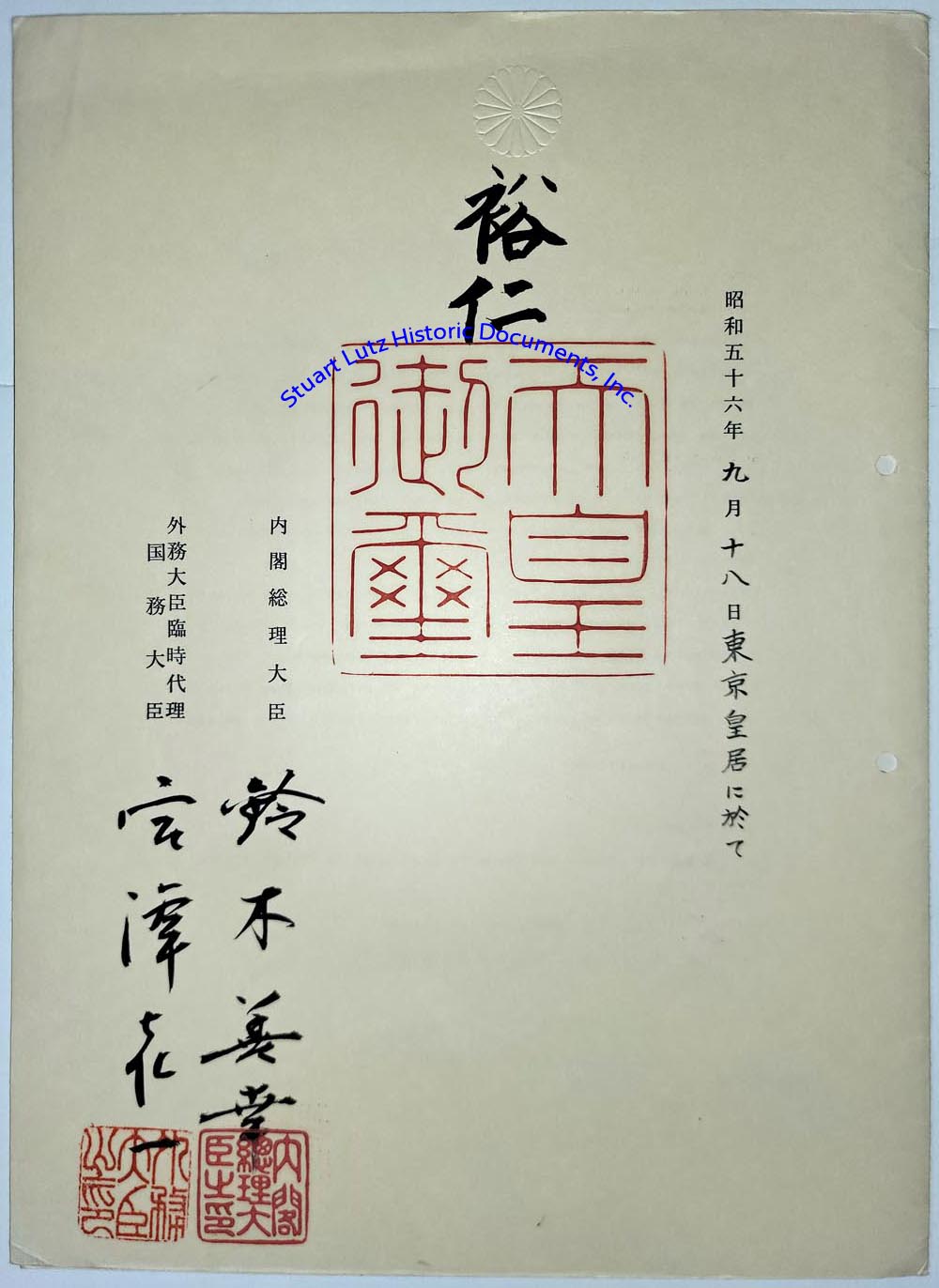
|
|
| |
| |
 DAVID HUME DAVID HUME |
|
|
|
|
| |
Price: $150.00 |
Stock# 5116 |
| |
SCOTTISH LAWYER DAVID HUME SEEKS A PENSION FOR A WIDOW
DAVID HUME (1747-1838). Hume was a Scottish lawyer and nephew of the famous philosopher by the same name.
LS. 2pgs. November 22, 1810. Edinburgh, Scotland. A letter signed “David Hume” and by three others. In their roles as estate trustees, Hume and other signatories seek a pension on behalf of a widow. “Sir You was so good as to say sometime ago, that you would make enquiry whether His Majesty’s Ministers were inclined to recommend to his Majesty, to continue any part of the Pension enjoyed by the late Mr. John Home, to his widow Mrs. Home. The Pension was £300 yearly from the Kinds Privy Purse, and the particulars of Mrs. Home’s situation are mentioned in a Memorial transmitted in the month of December 1808, to Lord Melville, and handed to you by his Lordship. As Trustees appointed by Mr. Home’s Settlement, we are directed, in the event of no sufficient part of the pension being continued to Mrs. Home, to vest such a sum of money as should appear necessary, on a liferent annuity to Mrs. Home, and as in prosecution of our duty as Trustees, it is now absolutely incumbent on us to purchase such annuity if there should be no assurance or reasonable expectation of obtaining a sufficient pension for her, we presume to give you this trouble to beg, that you would be so obliging as to inform us, as soon as possible, whether we can entertain any assurance or reasonable expectation of success to your application for that purpose, or in what state the business now is. We have the honour to be Sir Your most Obdt. Humble Serts David Hume M Home… John Home An answer may be addressed to Mr. David Hume or Mr. Home Signet Officer”. The letter is in fine condition with several fold lines and a small splotch on the first page. |
5116
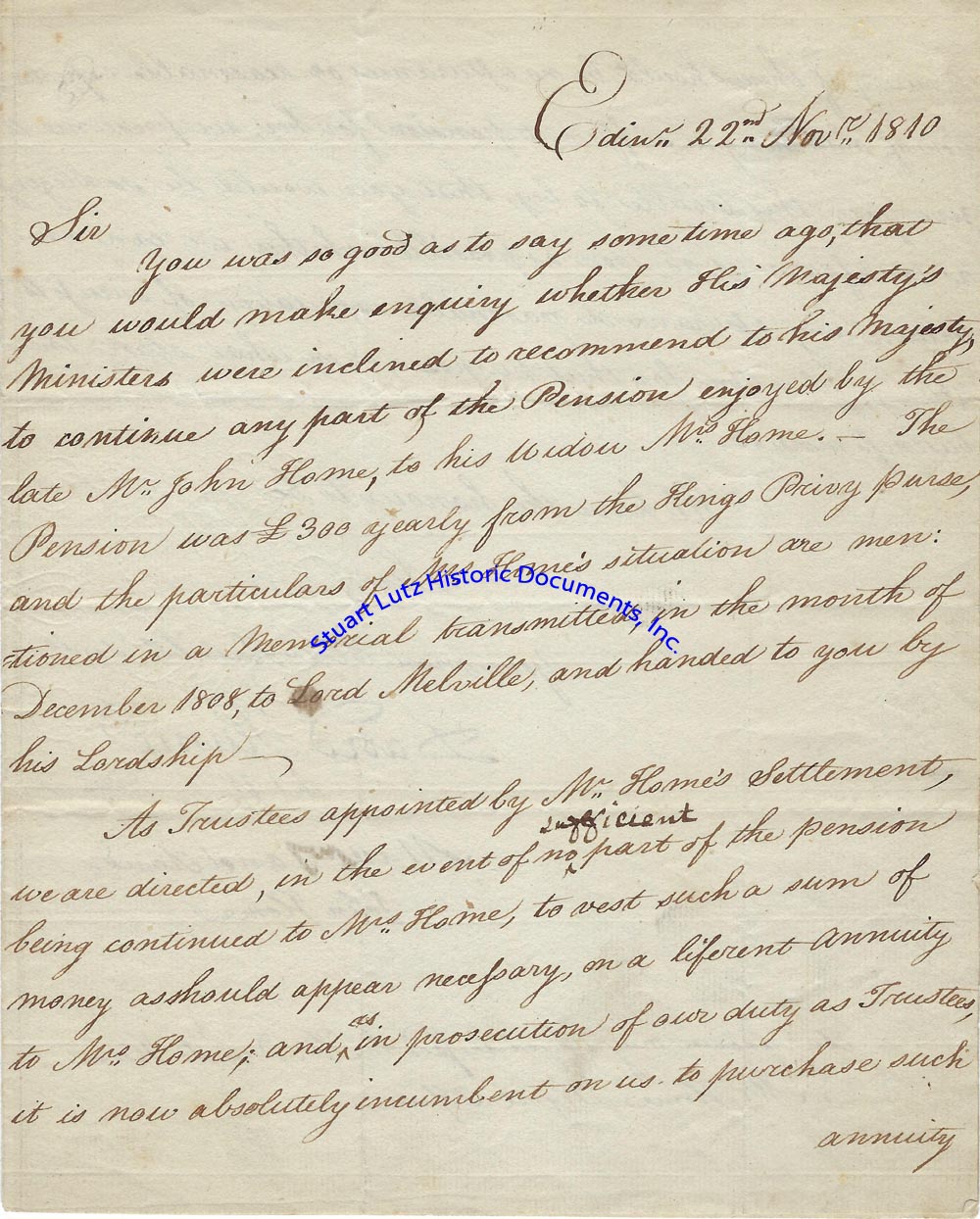
|
|
| |
| |
 GEORGE JOHNSTONE GEORGE JOHNSTONE |
|
|
|
|
| |
Price: $1,250.00 |
Stock# 5153 |
| |
A BRITISH MAN WHO HELPED SETTLE SOME OF THE POST-REVOLUTIONARY WAR CLAIMS ASKS ABOUT GETTING PAID FOR HIS DIPLOMATIC SERVICE: “DID NOT GOVR. JOHNSTONE PROPOSE TO ENTRUST HIM A CONSIDERABLE SUM OF MONEY FOR A PARTICULAR PURPOSE WHICH HE DECLINED”
GOVERNOR GEORGE JOHNSTONE (1730-1787). Johnstone was a Royal Navy officer who served during the American Revolution. He was a director of the East India Company and was the first Governor of West Florida from 1763 to 1767.
FREDERICK NORTH, LORD NORTH (1732-1792). North was the British Prime Minister during the American Revolution.
Two letters related to the post-Revolutionary War claims to compensate American loyalists who lost money and property during the conflict. The Americans, per the Treaty of Paris in 1783, were supposed to restore the property of British subjects, namely the Tories. When it was apparent that this was not going to happen, the British appointed commissioners to inquire into losses and award compensation.
a) ALS. 3pg. 7 ¼” x 9”. June 9, 1786. London. An autograph letter signed “Jno Patterson” to Governor Johnstone about payment for his negotiations with the new United States: “I am very sorry to be under the necessity of giving you any trouble at present, but having in my memorial to the Commissers. for examining American claims dated the 18th March 1784 – taken the liberty to refer to you, and the hearing of that memorial being fixed for Wednesday the 14th Inst. I am called upon for the proofs I then referred to Wsh. I hope will please my excuse. The following is the paragraph in my memorial ‘Upon my return to New York from Philada in April I recd letters from one of my friends in London acquainting me that commissers. Would be immediately appointed to treat with Congress and that the Minister was pleased to desire I wd. remain in America – That upon the arrival of Commissrs at New York, I waited on Govnr. Johnstone being formerly a little known to him, and was sent for by Mr. Eden to whom I was personally a stranger, and during their stay at New York, those gentlemen honored me on several occasions with a considerable degree of their confidence.’ The above mentioned letters sir were from my Bron. by desire of Lord North, with the reasons for which you were afterwards well acquainted and in consequence thereof, you honored me with the degree of confidence which my memorial mentions – Upon which I beg leave to state the following questions, written answers to Wsh. I understand will satisfy the board. 1st. Did Governor Johnstone know before he left England that Mr. Patterson had been wrote to by desire of Lord North, not to leave America until the Commissers. for restoring peace &c should arrive? 2nd Was not some confidential and secret business entrusted to Mr. Patterson by Lord North in conjunction with another gentleman and did not Govr. Johnstone and Mr. Eden confide in him in the prosecution of that business? And did he not acquaint himself to their satisfaction…3rd Did not Govr. Johnstone propose to entrust him a considerable sum of money for a particular purpose which he declined? If you have the smallest objection to the last question I beg you will omit it, but I have not doubt but you will recollect the circumstance; it was at your own house in the back room and my friend present…We both declined the offer, but thanked you for your confidence…I need not ask you Sir, to be explicit on the above points who are never otherwise, but I must entreat you to recall them to your recollection – the absence of Mr. Eden and the shortness o the notice I have recd. Has obliged me to trouble you or I would not do it, and I hope I may be honored with your answer, so as to have it next Tuesday…”. The letter has dark ink and is in fine condition.
b) AMS. 4pg. 7 ¼” x 9 ¼”. June 14, 1786. Taplow. An autograph manuscript signed “Govr. Johnstone” answering Patterson’s previous letter. The Governor wrote this manuscript that is entitled on the last page “To the Commissioners appointed to Settle the American Claims”: “Mr. John Patterson has transmitted to me the following queries to which he requests. I will transmit only Answers to your Board as being requisite in support of his claims. That the Answers may appear more distinct & I have inserted the Queries in one column & my answers in the Column opposite…”. The answers Johnstone wrote are: “1st Govr Johnstone did not know before he left Engd that Mr. Patterson had been wrote to by desire of Lord North not to leave American until the Commissrs. For restoring Peace &c should arrive”, “2d. Upon the arrival of the Commissrs. at New York it did appear that some confidential & secret Business had been entrusted by Lord North to Mr. Patterson in conjunction with another Gentleman & Govr. Johnstone in company with Mr. Eden had two or three conversations with Mr. Patterson…” and “3rd Govr. Johnstone does not recollect the least trace of ever having offered to entrust Mr. Patterson with a considerable sum of Money for a particular or any purpose & if any such conversation ever did pass it must have been done with a view of misleading Mr. Patterson’s friend who Mr. Patterson says was present & who was soon to go to the country…Mr. Johnstone says no more upon this subject. However to convince the Commissrs. how visionary all such extensive money transaction were, it may be necessary to observe that Mr. Johnstone had no Publick money he could lift or dispose of…All the Publick Money Mr. Johnstone ever received or distributed on the Commission to North America was 300 £, two hundred & thirty pounds of which was paid on the instant it was received, to induce a Gentleman to undertake a Voyage to Philadelphia whose name Govr. Johnstone has no difficulty in transmitting to the Commissrs…”. The manuscript has light soiling and a vertical fold. |
5153
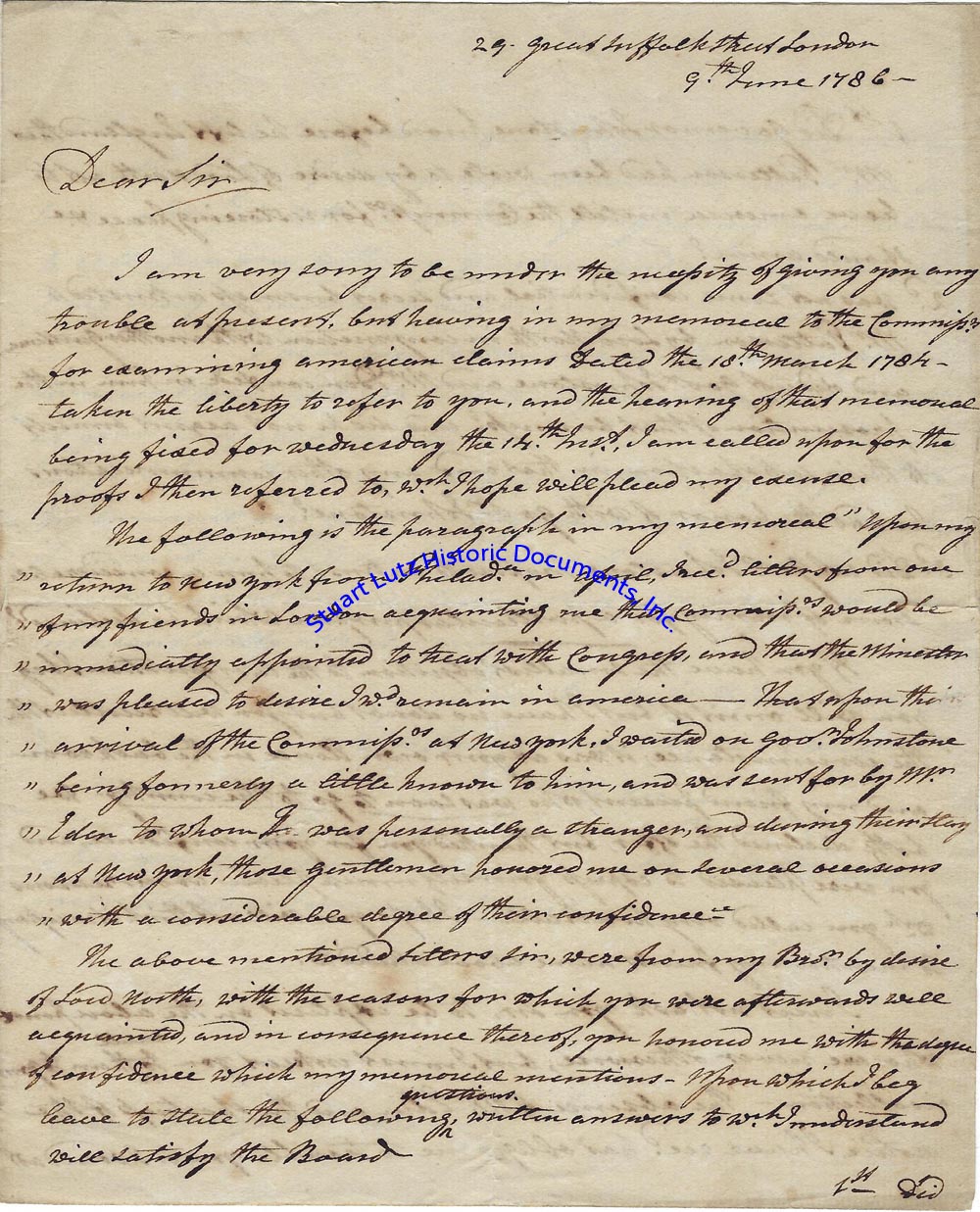
|
|
| |
| |
 KING FREDERICK OF DENMARK KING FREDERICK OF DENMARK |
|
|
|
|
| |
Price: $600.00 |
Stock# 5211 |
| |
SIGNED PHOTOGRAPH OF KING FREDERICK IX OF DENMARK
KING FREDERICK IX (1899-1972). Frederick was King of Denmark from 1947 to 1972.
PS. 8” x 10”. May 1964. N.p. [Denmark]. A black-and-white portrait photograph signed “Frederick R” in green ink as King of Denmark. T he photograph was given to American diplomat William McCormick Blair Jr. who was U.S. Ambassador to Denmark from 1961 to 1964. Frederick signed the bottom margin of the image and dated it. It is in very fine condition. |
5211
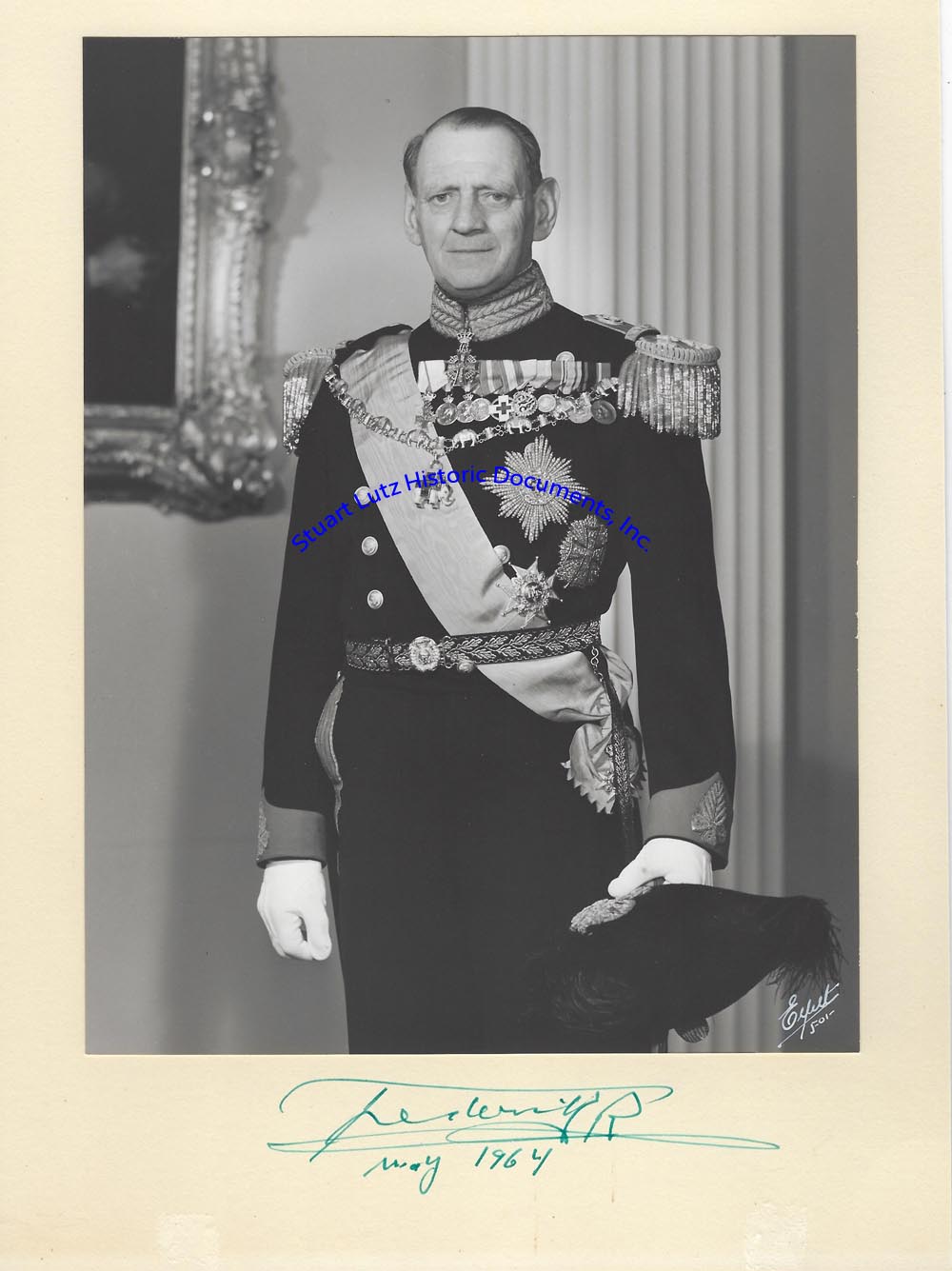
|
|
| |
| |
 KING GEORGE V KING GEORGE V |
|
|
|
|
| |
Price: $500.00 |
Stock# 5877 |
| |
HAND-WRITTEN LETTER BY KING GEORGE V BEFORE HIS REIGN TO THE PRESIDENT OF THE ROYAL ACADEMY OF ARTS
KING GEORGE V (1865-1936). King George V was King of Great Britain and the British Empire from 1910 to his death.
ALS. 1 pg. 6” x 8”. March 9, 1895. Windsor Castle. An autograph letter signed “George” on “Windsor Castle” letterhead accepting an invitation from “Sir Frederick”: “I shall have much pleasure in coming to the Royal Academy dinner on Saturday 4th of May. I kept that night free as I thought it would be the night of your banquet…George”. At this time, George was second in the line of succession behind his grandmother Queen Victoria, who would reign until 1901, and his father King Edward VII, whose short reign would end in 1910 and see George crowned King George V. Sir Frederick refers to Lord Frederic Leighton, an artist and pioneer in the “New Sculpture” movement serving as President of the Royal Academy since 1878. This would be his final banquet, as he would die suddenly the next year. The letter is faded at the bottom, but this does not hinder comprehension and is in otherwise very good condition. |
5877
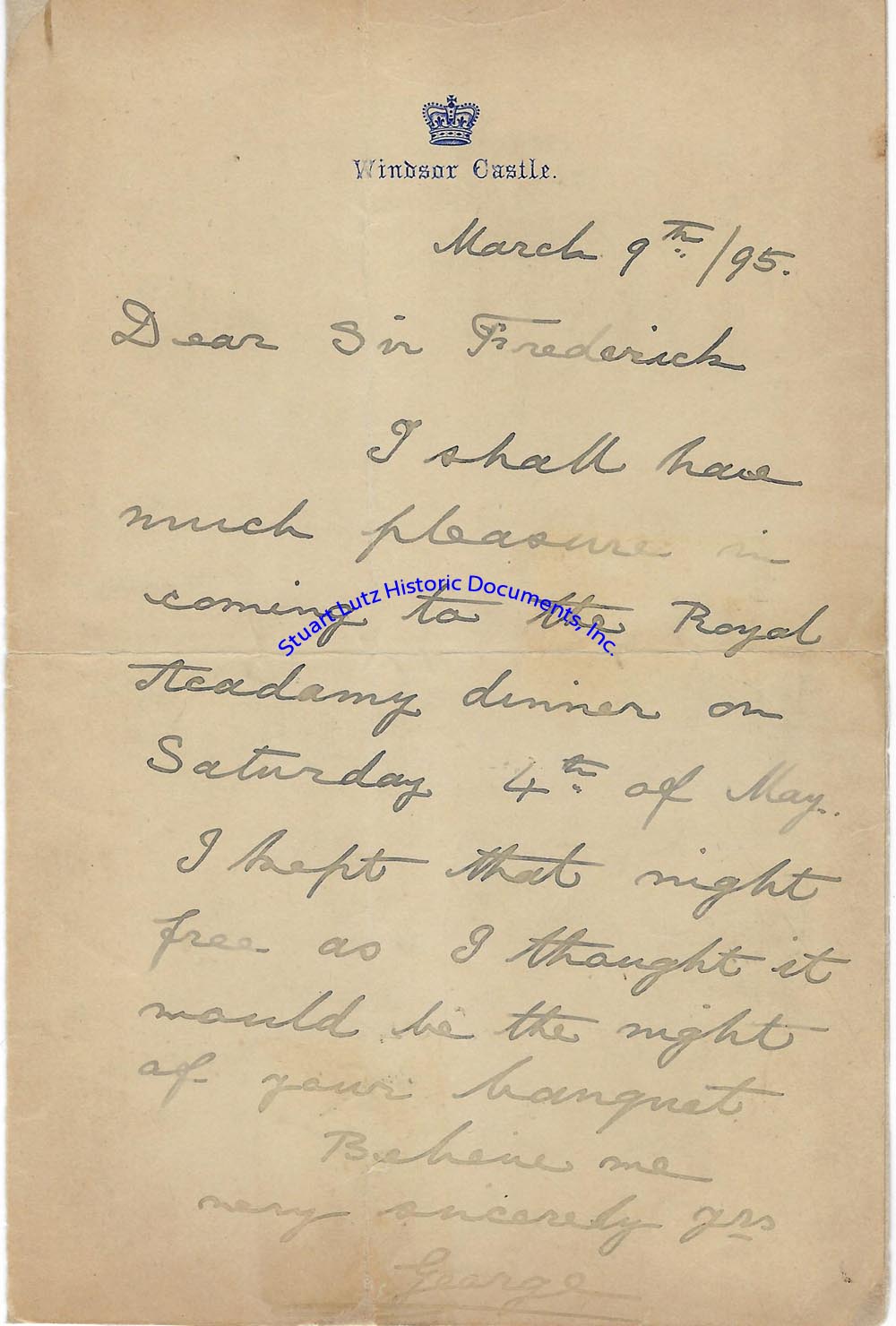
|
|
| |
| |
<Previous 6> <Next 6>
|
 |
